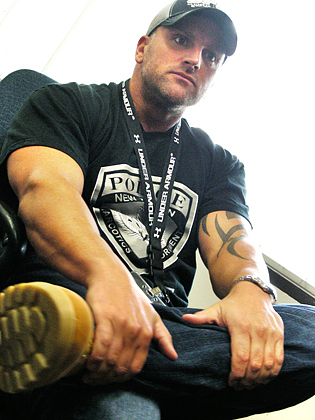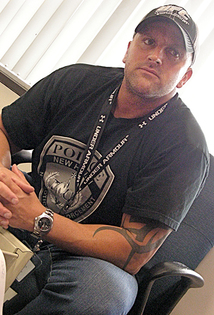 First he noticed the gun where the baby had been sitting. Then he noticed the boys outside shooting hoops. That made John Velleca think about his own days shooting hoops — and about why he now spends his time busting drug dealers.
First he noticed the gun where the baby had been sitting. Then he noticed the boys outside shooting hoops. That made John Velleca think about his own days shooting hoops — and about why he now spends his time busting drug dealers.
Lt. Velleca and the team of cops he oversees have been chasing drug dealers for over six months now. The scene of the baby on Valley Street shocked him, in one sense. In another, it was all too common.
The tactical narcotics unit, which Velleca rebuilt from scratch as part of a police shake-up, has come across young children all the time in its work. Before busting into a suspected drug house, the cops check with their informants about whether to expect children. They map out the house, identifying kids’ rooms.
But two weeks ago, when the unit raided a crack factory inside an apartment at the Valley Townhouses in the West Hills neighborhood, the informant hadn’t said anything about children.
As soon as the dozen detectives and sergeants entered the apartment, they spotted a mother holding an 8‑month-old baby. Det. Lisa Tuozzoli approached the mother. She asked her to pass the baby. Tuozzoli took the baby outside so he wouldn’t be around the commotion.
Next, the mother was brought outside. There, on the couch where she’d been sitting, lay a loaded Ruger 9 mm.
Nearby were crack cocaine, packaging materials, and two men wanted for violent crimes. One of the men, too, was armed.
As his team went about its work, Velleca thought about what he’d seen.
“It’s one thing to risk your own life,” he reflected. “I couldn’t believe a mother would put her child in jeopardy like that. What the hell [was she] doing with a kid in there?”
Afterward, there was no need for Velleca to talk with the two sergeants and 12 detectives in his unit about what they’d seen. All of the team members reporting to Velleca have children. He knows how powerful it feels for them to see other children at risk. There was no need to talk about how that makes their work even more important. “We know that,” he said.
Velleca doesn’t have children. He does have memories.
Across from the apartment he saw a basketball game going on. He recalled growing up in the Foxon area of East Haven, where his father ran a free basketball clinic for kids.
“We were always out in our neighborhood, playing football with friends. You could play basketball,” he recalled. “You never had to worry about drug dealers, shootings. My heart goes out to these kids. How could you properly mature in that environment?”
Cops can’t solve that problem. In Velleca’s view, they can help.
Targeting, Technology
Wearing an Ultimate Fighting Championships cap and a black Tactical Narcotics Unit T‑shirt, Velleca spoke in an interview at police headquarters about what he called a new philosophy in the unit that he rebuilt after a corruption scandal shut it down.
Historically, units like Velleca’s, with their battering rams and round-ups of street dealers, have served as symbols of the War on Drugs. To supporters, they represented tough action on a menace that destroys neighborhoods. To critics, they represented a futile and counterproductive assault on low-level drug offenders who end up returning to the streets anyway.
Velleca sought a different path from either outlook when Chief James Lewis last fall appointed him the “commander” to reconstitute the narcotics unit.
With a new mission statement and a new logo for its outfits, the unit hit the street in February. Besides targeting drug dealers, it busted and permanently shut down two massage parlors believed to be part of a nationwide Korean sex ring. Velleca also formed a two-person gang intelligence team.
And the team has been busy serving warrants on AWOL offenders and raiding drug “factories.”
“We get caught up in the ‘War on Drugs‘ cliche. This is not a war. The war is in Afghanistan,” said Velleca, who’s 40 and an 18-year veteran of the force.
“We’re trying to make our neighborhoods safer. Everybody should be able to enjoy their neighborhoods. They shouldn’t be afraid.”
In the 1980s, the police department had a so-called “Beat Down Posse”: a van of cops who stopped at drug corners to rough up suspected dealers. That ended with community policing in the 1990s. After that, the department briefly experimented with “ID-Net,” temporary saturation patrols and shakedowns in drug-plagued areas.
Velleca said he had no interest in that kind of policing when he took over the unit. Same with the cops who signed up. They all wanted to make sure they wouldn’t be “rolling into neighborhoods,” showing up on corners to frisk people at random, Velleca said.
In the past, Velleca said, “you [would] shake down 20 people and find two with drugs and say, ‘That’s good.’”
The new approach: targeting. Or as Chief Lewis calls it, “Targeted Area Policing,” or TAP. The unit goes after people it has already investigated and concluded are involved in the drug trade.
In addition to traditional informants and surveillance, Velleca has his eye on technology. He follows posts on the SeeClickFix citizen reporting website; his unit has made busts based on tips there. His gang-monitoring detectives find information right on Facebook and MySpace. Velleca can now receive text messages via the department’s tip line. This week he received a print-out of messages from a woman reporting a neighbor dealing in drugs on Thorn Street; Velleca planned to have someone check out the owner of a maroon Jeep Cherokee listed in one message.
In the past, Velleca said, the unit measured results by quantity. The more arrests, the better job it was doing.
The new unit does still keep stats. Tuesday he had a print-out showing 60 investigations started in August, 24 arrests, 14 search warrants executed, 10.3 grams of crack seized, 23 pounds of marijuana. (Click here for a story on a press conference about its first 100 days, stat-wise.)
But the unit doesn’t measure its success primarily through numbers, Velleca said. It measures through quality. “If we have to open only three investigations, that’s a win. We’re not a numbers-driven-unit.” His cops, he said, would “rather take one or two guns off the street than 300 kilos.”
Broken Windows Redux
 New Haven’s narcotics cops aren’t going to stop the flow of drugs into the country or the city, Velleca said. Nor do they try to. The feds do that.
New Haven’s narcotics cops aren’t going to stop the flow of drugs into the country or the city, Velleca said. Nor do they try to. The feds do that.
The narcotics unit in New Haven is part of a larger effort, he said — not a war against drugs, but a department-wide campaign to maintain order and a decent quality of life that has coincided with a 10 percent drop in crime. The campaign includes traffic enforcement and burglary investigations, among other crimes. Velleca’s cops may be confiscating crack and locking up dealers. But like other city cops they’re primarily fixing “broken windows,” he said.
Which brings up a question: Whose broken windows?
That term has different meanings for different cops, as New Haven has learned.
The term was popularized two decades ago during the dawn of community policing. It refers to nuisance problems in a neighborhood — literal broken windows, loitering, public drunkenness, low-level drug dealing — that receive less attention than major crimes from strapped police departments. “Broken windows” lead to bigger problems in a neighborhood by sending a message of disorder. Rather than chasing after crimes that have already occurred, cops can better protect communities by addressing small problems before they grow, the argument went.
That argument became the basis for community policing experiments across the country. Most experiments shared some approaches: Neighborhood patrol beats, attention to “quality of life crimes,” intense, weekly or daily review of block-by-block statistics in order to spot trends and hold district cops accountable.
From there, the experiments took different forks. In New York City, “broken windows” policing meant locking up squeegee men and as many drug dealers and offenders as possible, with a military, aggressive presence on the streets . In New Haven, it meant “harm reduction.” It meant driving low-level dealing indoors, away from violence, while focusing on and locking up leaders of drug gangs; forming partnerships with social agencies; disciplining rogue cops; enlisting child shrinks to work with cops to identify and help young children who witness violence or start acting out; referring people with drug problems to treatment programs and pioneering the needle exchange. Both New York and New Haven saw dramatic declines in violence.
In the interview this week Velleca advocated a third path: Not random street sweeps. But, yes, a focus on locking up dealers, including lower-level dealers. He considers them broken windows. For several reasons.
One reason: Where you find drug-dealing, you often find violence. Rivals shooting each other. Or customers and dealers pulling guns on each other.
Another reason: Even if there’s not violence now, there will be soon, he argued. Even if drug-dealing business stays stable for as long as six months on a corner, “eventually soemebody is going to try to rob you. You’re going to get a gun. Then it starts.”
Another reason: Even if there weren’t violence, drug-dealing brings disorder to a street. Stoned or drunk people milling around. “Constant traffic.” Unsavory characters. People start to feel uneasy on their own blocks, and unsafe.
And finally, even inside a house, there are little kids like the 8‑month-old baby on Valley Street sitting on a loaded gun. It happens more than you might think, he said.
Less than a week after that Valley Townhouses raid, Velleca’s cops returned to a different apartment on the same street. They had a warrant. They found two wanted men, crack, packaging materials, a loaded .357 handgun — and a 9 month-old girl and 6 year-old boy in the room.
When Velleca left the scene of the earlier raid, he didn’t have any illusions about stopping the flow of cocaine into New Haven. He did believe that a little boy was safer than before — and that the basketball game across the street could continue. “At least for tonight,” he said, “they’re not going to have to worry about these idiots” dealing crack.
For his part, Velleca has stopped shooting hoops or watching the game much. He prefers watching baseball these days. And playing golf.
Read other installments in the Independent’s “Cop of the Week” series:
• Shafiq Abdussabur
• Det. Scott Branfuhr
• Dennis Burgh
• Sydney Collier
• David Coppola
• Joe Dease
• Brian Donnelly
• Anthony Duff
• Bertram Etienne
• Jeffrey Fletcher
• Renee Forte
• William Gargone & Mike Torre
• Jon Haddad & Daniela Rodriguez
• Dan Hartnett
• Ray Hassett
• Robin Higgins
• Ronnell Higgins
• Racheal Inconiglios
• Hilda Kilpatrick
• Anthony Maio
• Steve McMorris
• Stephanie Redding
• Tony Reyes
• Luis & David Rivera
• Salvador Rodriguez
• Brett Runlett
• David Runlett
• Marcus Tavares
• Martin Tchakirides
• Stephan Torquati
• Kelly Turner
• Alan Wenk
• Michael Wuchek
• David Zaweski
(To suggest an officer to be featured, contact us here.)